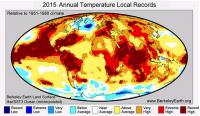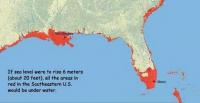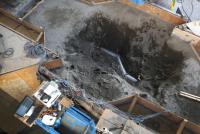-
Climate change already accelerating sea level rise
Greenhouse gases are already having an accelerating effect on sea level rise, but the impact has so far been masked by the cataclysmic 1991 eruption of Mount Pinatubo in the Philippines, according to a new study. Satellite observations, which began in 1993, indicate that the rate of sea level rise has held fairly steady at about three millimeters per year. But the expected acceleration due to climate change is likely hidden in the satellite record because of a happenstance of timing: The record began soon after the Pinatubo eruption, which temporarily cooled the planet, causing sea levels to drop.
-
-
Seawalls, coastal forests in Japan help reduce tsunami damage
Researchers who analyzed a history of tsunamis along the Pacific coast of Japan’s Tohoku region have learned that seawalls higher than five meters reduce damage and death, while coastal forests also play an important role in protecting the public. Japan has embarked on a 10-year reconstruction project costing about 31.5 trillion yen, or about $255 billion, which includes the construction of tsunami seawalls along Tohoku’s Pacific coast. Critics of the program have voiced skepticism about the effectiveness of seawalls.
-
-
Worst flooding since 1998 leaves $33 billion economic toll in China

The new Global Catastrophe Recap report, covering July 2016 disasters, reveals that much of China endured substantial seasonal “Mei-Yu” rainfall that led to a dramatic worsening of flooding along the Yangtze River Basin and in the country’s northeast. Total combined economic losses were estimated at $33 billion. Meanwhile, the United States recorded six separate outbreaks of severe convective storms and flash flooding from the Rockies to the East Coast. Total combined economic losses were minimally estimated at $1.5 billion. Only 2 percent of China damage is covered by insurance, compared to nearly 70 percent for U.S. storms.
-
-
Build disaster-proof homes before storms strike, not afterward
There are many technologies we can use to make our buildings more hazard-resistant. But we are not using them as extensively as we should. Instead of designing a building to reduce potential damage from the hazards it may face over its lifetime, most construction projects focus on saving money up front. By choosing the lowest construction cost possible, homeowners, insurance agencies, and taxpayers may end up paying for it many times over when natural disasters occur. To prevent the devastation from another storm, twister, or quake, we need to make deep investments nationwide in mitigation now, before the next disaster strikes.
-
-
Making climate change summaries suitable for “grownups,” but accessible to policymakers
Researchers examined the writing and editing procedures by which the Intergovernmental Panel on Climate Change creates summaries of their findings for policymakers. Despite recent critiques that these summaries are too difficult for non-experts, the researchers found them comparable to reference texts in terms of reading comprehension level. Nevertheless, the researchers also suggest ways that the summary reports could be improved by using less jargon and more cohesive language to link the ideas they contain.
-
-
Adaptation to climate risks: Political affiliation matters
A new study reveals that those who affiliate with the Democratic Party have different views than those who vote Republican on the following issues: the likelihood of floods occurring, adopting protection measures, and expectations of disaster relief from the government.
-
-
2015 surpassed 2014 as the warmest year since at least the mid-to-late nineteenth century

A new State of the Climate report confirmed that 2015 surpassed 2014 as the warmest year since at least the mid-to-late nineteenth century. Last year’s record heat resulted from the combined influence of long-term global warming and one of the strongest El Niño events the globe has experienced since at least 1950. The report found that most indicators of climate change continued to reflect trends consistent with a warming planet. Several markers such as land and ocean temperatures, sea levels, and greenhouse gases broke records set just one year prior.
-
-
False earthquake smartphone alert sends Japanese into panic
Thousands of Tokyo residents were sent into panic by an erroneous alert that a massive earthquake had hit the Japanese capital. The alert also disrupted some train services. The Japanese Meteorological Agency issued, and then sent, the alert just after 5 p.m., saying a magnitude-9.1 quake had struck the city. The agency cancelled the alert a few seconds later, but tens of thousands of smartphone owners who subscribe to the popular Yurekuru disaster warning app had already received the alert.
-
-
How to generate energy during earthquakes
Physics students from the University of Leicester have explored a feasible way to harness the power of earthquakes during a disaster in order to keep vital systems powered. By using a magnet inside a coil during the shaking of tectonic plates that occurs during an earthquake, the students suggest that the magnetic field created by the shaking could generate a current which could potentially be harnessed.
-
-
Fort Collins, Colorado, using NIST guide to bolster community resilience
Guided in part by strategies and procedures developed by NIST for creating effective and affordable community resilience, the city of Fort Collins, Colorado, is making a commitment to “deal with prospects of future weather- and climate-related challenges that put our community at greater risk,” according to Mayor Pro Tem Gerry Horak.
-
-
Electric grid vulnerabilities in extreme weather areas
Climate and energy scientists at the DoE’s Oak Ridge National Laboratory have developed a new method to pinpoint which electrical service areas will be most vulnerable as populations grow and temperatures rise. The scientists’ integrated approach – combining ORNL’s unique infrastructure and population datasets with high-resolution climate simulations run on the lab’s Titan supercomputer — identifies substations at the neighborhood level and determines their ability to handle additional demand based on predicted changes in climate and population.
-
-
Nuking asteroids to protect Earth

Scientists are developing measures to protect the Earth from potentially dangerous celestial bodies. With the help of supercomputer SKIF Cyberia, the scientists simulated the nuclear explosion of an asteroid 200 meters in diameter in such a way that its irradiated fragments do not fall to the Earth.
-
-
Sea-level rise threatens many coastal U.S. military bases

The U.S. Armed Forces depend on safe and functional bases to protect the U.S. national security. Sea levels are rising as global warming heats up the planet, and many military bases along the U.S. East Coast and Gulf of Mexico are at risk of permanently losing land to the ocean in the decades ahead. As the seas rise, high tides will reach farther inland. Tidal flooding will become more frequent and extensive. When hurricanes strike, deeper and more extensive storm surge flooding will occur. The United States must thus prepare for the growing exposure of its military bases to sea level rise.
-
-
Warmings greater than 1.5 °C inevitable owing to current atmospheric greenhouse concentrations
Current levels of atmospheric greenhouse gas concentrations already commit the planet to air temperatures over many land regions being eventually warmed by greater than 1.5°C, according to new research. The results of the new study have implications for international discussions of what constitutes safe global temperature thresholds, such as 1.5°C or 2°C of warming since pre-industrial times. The expected extra warming over land will influence how we need to design some cities. It could also impact on the responses of trees and plants, including crops.
-
-
Earthquake-resilient pipeline could allow Los Angeles’s water utility system withstand tremors

Los Angeles’s water utility system – the nation’s largest — crosses over thirty fault lines en route to supplying water to more than four million residents. A top engineer from the city of Los Angeles visited Cornell University this month as researchers tested a new earthquake-resilient pipeline designed better to protect southern California’s water utility network from natural disasters. The steel pipe uses a unique structural wave design to control buckling, allowing the pipe to bend and compress without rupturing or losing water pressure.
-
- All
- Regional
- Water
- Biometrics
- Borders/Immig
- Business
- Cybersecurity
- Detection
- Disasters
- Government
- Infrastructure
- International
- Public health
- Public Safety
- Communication interoperabillity
- Emergency services
- Emergency medical services
- Fire
- First response
- IEDs
- Law Enforcement
- Law Enforcement Technology
- Military technology
- Nonlethal weapons
- Nuclear weapons
- Personal protection equipment
- Police
- Notification /alert systems
- Situational awareness
- Weapons systems
- Sci-Tech
- Sector Reports
- Surveillance
- Transportation
Advertising & Marketing: advertise@newswirepubs.com
Editorial: editor@newswirepubs.com
General: info@newswirepubs.com
2010-2011 © News Wire Publications, LLC News Wire Publications, LLC
220 Old Country Road | Suite 200 | Mineola | New York | 11501
Permissions and Policies
Editorial: editor@newswirepubs.com
General: info@newswirepubs.com
2010-2011 © News Wire Publications, LLC News Wire Publications, LLC
220 Old Country Road | Suite 200 | Mineola | New York | 11501
Permissions and Policies
